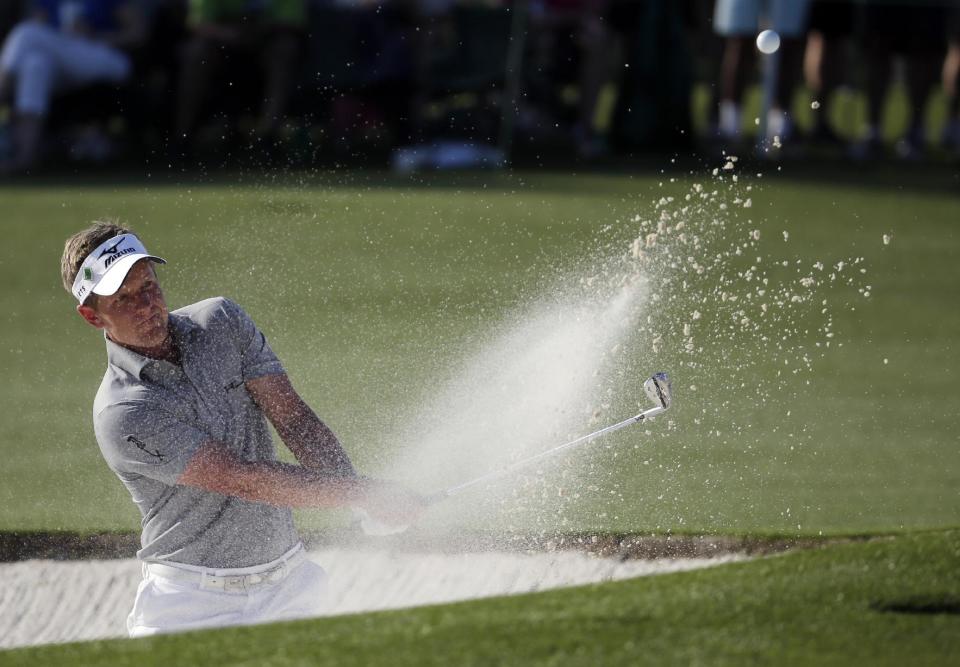Golf fans playing referee needs to stop

AUGUSTA, Ga. – Golf has a lot of rules. A lot. At the heart of each one is a good intention, so this isn't a debate about the rules, per se.
Certainly not Rule 13-4, which Luke Donald violated during Thursday's opening round of the Masters when he smacked his club against the sand after hitting a shot in a greenside bunker on the ninth hole.
Rule 13-4 essentially states you can't touch your club to the ground in a hazard, in this case the hazard being a sand trap. Donald hit his shot, then smacked his club against the ground after the ball ended up back in the bunker.
The smack of the club cost Donald a two-stroke penalty. He finished the day seven-over.
The problem isn't that Donald was assessed the penalty, but who called him on it: a fan watching saw it happen and alerted tournament officials, none of whom had noticed.
A fan, in this case, one on the grounds of Augusta National who was just standing nearby.

It also could've been someone at home watching on television who sees something when he watches and re-watches a shot on a big screen and dials into Augusta National, which is exactly what happened last year to Tiger Woods.
"We have an incoming call from an Eldrick W. of Jupiter, Fla."
This has to stop.
Penalties needed to be called by players themselves or rules officials who are watching closely. Other players in the group should also be able to point out a potential violation to an official.
Other than that, this isn't the job of anyone outside the theater of competition, because there is literally no end to the potential protests. Worse is some penalties can come after competition is over, even after a player erroneously signs the wrong scorecard, risking complete disqualification, creating a sort of retroactive ridiculousness.
It also disfavors players who are followed by larger galleries, get more television time, play during time slots with higher viewership or are unpopular. Logistically there are just too many issues.
[Slideshow: Round 2 of the Masters]
Fans need to watch and enjoy the action. Players and officials need to handle the rest.
Even the fan who pointed out Donald's error to rules officials is uncertain whether he should have such influence.
"I'm ambivalent about it," said the fan, who asked Yahoo Sports to identify him only as John, a 40-year-old from the Atlanta area. "I'd be fine if it wasn't part of the game, but today, it is. If [reporting penalties] is something golf doesn't want to happen, they shouldn't give fans access to rules officials."
Golf likes to see itself as a sport that polices itself, one that is rooted in sportsmanship and self-penalty. The vast majority of golf rounds have no scoring officials, so this is imperative.
In other sports, the proper strategy for an athlete is to push the boundaries of the rules, cheat even, and hope the ref doesn't see it. It's not a foul unless the referee blows his whistle.
In golf the player is supposed to turn himself in. That level of ethics is fairly comical to recreational golfers, many of who hack around while drinking, smoking and eyeballing the cart girl. This is the Masters though, the highest level of tournament competition, and so that standard should be adhered.
Donald said Friday that he realized right away the mistake he made, but didn't want to speak to an official until after the round.
"I was very aware that I did it," he said Friday. "I had a pretty good idea it was a penalty. But I didn't want to talk to a rules official during the round. So as soon as I finished, I found Fred Ridley and brought it up."
His violation was essentially swinging it in frustration after his first chip out of the sand failed to clear the bunker, a move that while technically wrong likely garnered him no advantage. On Twitter he called it a “dumb mistake.”
The Masters told Yahoo Sports that tournament officials approached Donald after he came off the 18th green about the claim by a fan that he'd grounded his club on nine. If necessary, the tournament could have reviewed footage of the moment in an attempt to determine whether the act had indeed occurred.
In this case, however, that wasn't needed, according to the Masters.
Because this happened in the first round by a golfer that is likely already out of contention, it isn't a huge story.
It could be though. There is nothing that is preventing this exact scenario to unfold during the finishing holes Sunday afternoon.
That's why the fans need to stay out of it, even if it means a violation gets missed.
Different tournaments have different ways of using scoring officials. At the Masters, some 60 scorers fan out across the course and take various territories – tees, fairways, greens. They are charged with making sure the rules are followed. Other officials are already watching on television, especially during the most critical moments of an event.
That needs to be enough. Because otherwise, nothing is enough.
Maybe something gets missed, but that's better than a dragnet of fans and viewers trying to rat out every potential violation they may or may not have seen. This isn't the speed of an NFL or NBA game. Players and officials do a good enough job. Perfection comes at a price in a modern era of so much technology. That price is enough to make the slight imperfection of something being missed acceptable.
Deputizing the fans is an idea that needs to end.
More Masters coverage on Yahoo Sports:

 Yahoo Sports
Yahoo Sports 